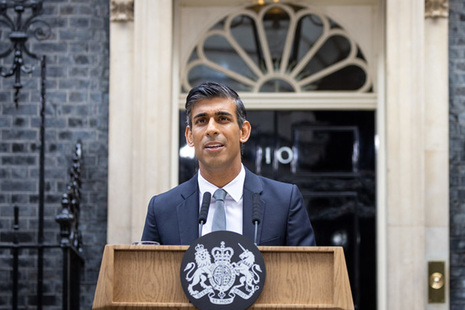The Rt Hon Rishi Sunak MP
 Biography
BiographyRishi Sunak became Prime Minister on 25 October 2022.
He was previously appointed Chancellor of the Exchequer from 13 February 2020 to 5 July 2022.
He was Chief Secretary to the Treasury from 24 July 2019 to 13 February 2020, and Parliamentary Under Secretary of State at the Ministry of Housing, Communities and Local Government from 9 January 2018 to 24 July 2019.
Education
Rishi went to Winchester College and studied Politics, Philosophy and Economics at Oxford University. He was also a Fulbright Scholar at Stanford University (USA) where he studied for his MBA.
Political career
Rishi was elected Conservative MP for Richmond (Yorks) in May 2015 and served as a Parliamentary Private Secretary at the Department for Business, Energy and Industrial Strategy from June 2017 until his ministerial appointment.
Career before politics
Rishi spent his professional career before politics in business and finance, working internationally. He co-founded an investment firm working with companies in multiple geographies. He then used that experience to help small and entrepreneurial British companies grow.
Personal life
Rishi is married with two young daughters.
Prime Minister
The Prime Minister is the leader of His Majesty’s Government and is ultimately responsible for the policy and decisions of the government.
As leader of the UK government the Prime Minister also:
- oversees the operation of the Civil Service and government agencies
- chooses members of the government
- is the principal government figure in the House of Commons
As Minister for the Union, the Prime Minister works to ensure that all of government is acting on behalf of the entire United Kingdom: England, Northern Ireland, Scotland, and Wales.
First Lord of the Treasury
The First Lord of the Treasury is one of the Lords Commissioners of the Treasury. This role is usually held by the Prime Minister.
Since the 17th century, the Lords Commissioners of the Treasury have collectively carried out duties that were previously held by the Lord High Treasurer (head of His Majesty’s Treasury).
The Lords Commissioners of the Treasury also include:
- the Second Lord of the Treasury - the Chancellor of the Exchequer, who has most of the functional financial responsibilities
- Junior Lords Commissioners of the Treasury - other members of the government, usually government whips in the House of Commons
10 Downing Street is the official residence of the First Lord of the Treasury, and not of the Prime Minister.
Minister for the Union
As Minister for the Union, the Prime Minister works to ensure that all of government is acting on behalf of the entire United Kingdom: England, Northern Ireland, Scotland, and Wales.
Minister for the Civil Service
The Minister for the Civil Service is responsible for regulating the Civil Service.
The Civil Service (Management Functions) Act of 1992, allows the Minister for the Civil Service to delegate power to other ministers and devolved administrations.
This role was created in 1968 and is always held by the Prime Minister.



0 Comments